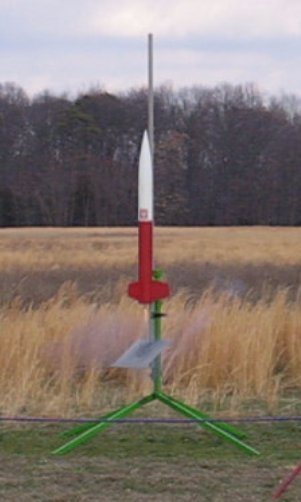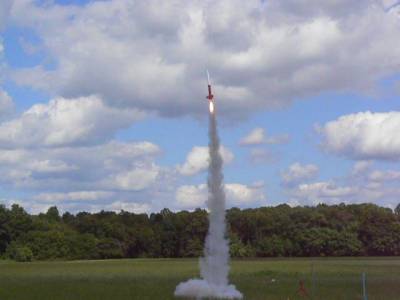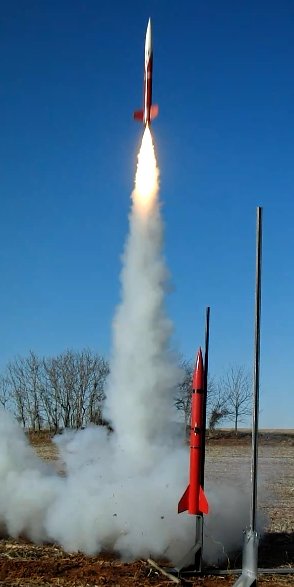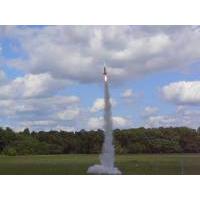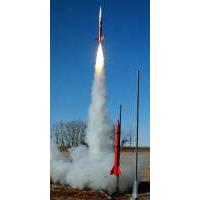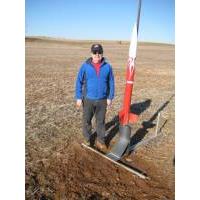| Construction Rating: | starstarstarstarstar |
| Flight Rating: | starstarstarstarstar |
| Overall Rating: | starstarstarstarstar |
| Published: | 2011-10-21 |
| Manufacturer: | BSD High Power Rocketry  |
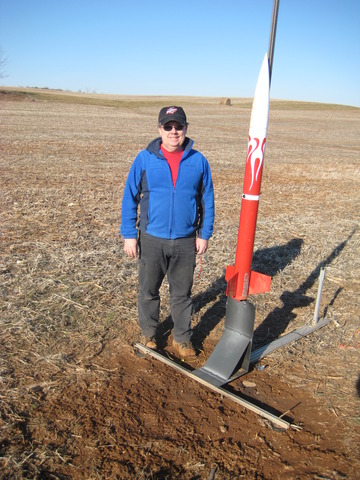 Brief
Brief
BSD Horizon (4") with 38mm motor mount. I flew this rocket stock for my Level 1, and I later modified it to use dual deployment for my Level 2.
Components
BSD Rocketry Horizon (4" diameter) with 38mm motor mount and G-10 fins
Components:
- Nose cone
- Payload section (10")
- Tube coupler, bulkhead plate, and hardware
- Booster section (24")
- 38mm motor tube (11.25")
- Centering rings (2)
- G-10 fins (3)
- Rail buttons
- Motor retention hardware (clip style)
- Plastic rivets (3)
- 36" nylon parachute, nylon shock cord strap, and 15" tubular nylon shock cord
- 29mm to 38mm motor adapter
Add-ons:
- LOC EXL 3.9 - 3.9" avionics bay and 15" payload section
- Aeropack 38mm motor retainer
- Centering ring (4" to 38mm)
- U-bolts (3)
Electronics:
- PerfectFlite miniAlt/WD altimeter
- Commonwealth Displays BH9VW 9v battery holder
- Altimeter wiring kit from Dog House Rocketry - nice set with quick disconnect wires, terminal blocks, and a switch.
- Keyswitch and Remove Before Flight flag from Aerocon Systems
Recovery:
- Chute: kit supplied 36" chute
- Kevlar chute protector from Giant Leap Rocketry
- 1/4" tubular kevlar shock cord with loops from Giant Leap Rocketry
- Quick links from the local hardware store
Construction
Stock build for Level 1:
The Horizon is a great kit! I built it according to the very thorough instructions with a couple of exceptions:
- I did not use the kit supplied eyebolt on the motor mount. I replaced it with a 1/4" u-bolt from my local hardware store.
- I ordered an extra centering ring and epoxied it just forward of the fins on the motor tube.
- I did not epoxy the rear centering ring to the motor tube until after the tube had been installed in the booster, fins attached, and internal fillets applied to the fin/motor tube joints.
- I replaced the kit supplied nylon shock cord strap and tubular nylon shock cord with a 1/4" tubular kevlar shock cord (with loops).
Modifications for dual deployment and Level 2:
I knew I wanted to eventually configure the Horizon for dual deployment. To do this, I chose the LOC 4" avionics bay with extended payload section. The LOC bay came with all the hardware needed to put the bay together. I assembled the avionics bay according to the instructions. However, I installed u-bolts on the end caps in place of the eyebolts. One leg of the u-bolt went into the center hole of the end cap, and I drilled another hole for the second leg. I could not find forged or welded eyebolts at my local hardware store, but they did carry u-bolts. I didn't want to suffer a recovery failure from an opened eyebolt!
I decided to go with the PerfectFlite MAWD for my altimeter since it was able to record flight data in addition to having dual pyro channels. I installed the MAWD mounting hardware on the plywood sled included with the LOC bay. I also mounted a 9V battery holder from Commonwealth Displays to the sled. I used an altimeter wiring kit from Dog House Rocketry which included quick disconnect wiring along with terminal blocks.
I drilled holes for the terminal block screws and a pass through hole for the terminal block wiring in the end caps for the avionics bay. I fastened the terminal blocks using the screws included in the wiring kit. I passed the terminal block wiring through the drilled holes and attached to the terminal blocks. I then sealed the holes with a dab of epoxy. I drilled a hole through the switch band for a keyswitch from Aerocon Systems. I soldered a wiring connector to the switch then installed it in the hole. I drilled 3 static ports in the switch band based on size information from the MAWD manual. Once everything was complete, I installed the altimeter and a battery. I connected christmas tree bulbs to the terminal blocks and powered up the altimeter. Once I verified continuity, I covered two of the holes and applied a vacuum to the third hole. As soon as I let go, I could see the apogee bulb light up followed by the main bulb a couple of seconds later. Success!
I attached the payload section to the avionics bay and drilled two 1/8" holes for the attachment points. I removed the payload section and enlarged the holes in the avionics bay to allow a t-nut to be mounted from the inside. I used a dab of epoxy to fasten the t-nuts to the avionics bay. Once the epoxy was dry, I re-attached the payload section and installed the 4-40 screws. Looking good!
Last up was the nose cone. I drilled a hole in the nose cone shoulder and dropped in a 1/4" nut. With some minor fiddling, I was able to get the nut threaded onto the end of an eyebolt inserted into the center hole of the nose cone. I dripped some epoxy into the hole to secure the nut from coming loose. Next, I placed the nose cone on top of the payload section and marked three equally spaced holes for 2-56 nylon shear pins. I drilled the first hole, inserted a shear pin, then repeated this sequence for the remaining two screws. I used a Sharpie to number the holes on both the nose cone shoulder and inside the payload section.
Finishing
For the stock Horizon, I chose not to use the suggested paint scheme and included vinyl decals. Instead, I painted the booster Krylon Banner Red. The nose cone and payload section were painted Krylon Gloss White. I applied a Polish Eagle decal I found on the internet to the payload section. I used several coats of Krylon Clear to finish the rocket.
For the modified version, I painted the avionics switch band Krylon Gloss White. I painted the new payload section Krylon Banner Red to match the stock booster section. I then contacted Mark at Stickershock who put together a set of white vinyl flames for me. I applied the flames at the top of the payload section. Again, Krylon Clear was used as a top coat.
Flight
- 9/17/06: Level 1 (stock configuration) on AT H128W (AT 29/180 case in a Slimline 29-38mm adapter). I drilled the delay from 10 seconds to 6 seconds. It was an excellent flight - arrow straight boost with signature white lightning smoke trail.
- 1/27/08: Sport flight (stock configuration) on AT G80-4T (in a Slimline 29-38mm adapter). Good boost, although this motor was probably on the low end for this rocket.
- 2/15/09: Sport flight (stock configuration) on CTI Pro38 1 Grain G115WT. I drilled the delay to 6 seconds. Awesome boost - I really like the G115WT motor!
- 10/30/10: Sport flight (stock configuration) on AT H123W (AT 38/240 case). I drilled the delay from 10 seconds to 7 seconds. This was an excellent flight with the chute deploying right at apogee. The H123W is a great motor for this kit!
- 2/12/11: Level 2 attempt (modified configuration) on AT J350W (AT 38/720 case). Awesome boost! I really love the large flame and super white smoke trail from the J350W.
- 2/12/11: Level 2 (modified configuration) on AT J350W (AT 38/720 case). After a disappointing first flight, I was encouraged by a fellow Viking to fly a second time (thanks, Jim!). I obtained another reload from the on-site vendor, cleaned the motor case, and quickly prepared the rocket and motor for another flight. Wow! The J350W was just as impressive the second time around! Awesome motor!
Recovery
- Level 1 on AT H128W using the kit chute in a kevlar chute protector. The chute deployed right at apogee, and the rocket landed without damage. It was an excellent flight! Level 1 certified!
- AT G80-4T using the kit chute in a kevlar chute protector. The nose cone popped off but the chute stuck in the end of the tube. The flight was low, and the field was very soft so the rocket landed without damage.
- CTI G115WT using the kit chute in a kevlar chute protector. The chute deployed right at apogee, and the rocket landed without damage.
- AT H123W using the kit chute in a kevlar chute protector. The chute deployed right at apogee. Rocket landed softly with no damage.
- Level 2 attempt on AT J350W using a drogueless apogee deployment and a borrowed golf umbrella chute (thanks, Jeff!). As luck would have it (actually poor planning on my part), I left my second kevlar shock cord and main chute at home. I was able to borrow a chute and shock cord to make this flight. The drogue charge was 0.875g and main charge was 1.25g (as determined by ground testing) in Newton's Third pre-wired canisters. The payload and booster sections separated at apogee as planned. The MAWD fired the main charge at 700' as planned, and the nose cone popped off but failed to pull the main chute out of the payload section. The rocket landed flat in a very soft field with no damage. I determined that a slight increase in the size of the main charge was needed.
- Level 2 on AT J350W using a drogueless apogee deployment and the borrowed golf umbrella chute. I kept the drogue charge at 0.875g and increased the main charge to 1.5g (still using the Newton's Third canisters). The payload and booster sections separated at apogee as planned. The MAWD fired the main charge at 700' as planned, and the nose cone and chute deployed perfectly. Excellent flight! Level 2 certified!
Summary
One word - awesome! I love the Horizon because it is a simple but very strong design. The rocket has survived a couple of goofs on my part with nothing more than some dirt and a couple of scratches. This was a perfect choice for my Level 1 and Level 2 certification flights! I hope to get many more flights out of my Horizon!
Other Reviews
- BSD High Power Rocketry Horizon By F.W. Dick
Overview I had never built a high power kit, but after many hours searching the Internet, I felt confident in placing an order for a BSD Horizon. The company’s website was pretty adamant about the Horizon being the best way to certify Level 1. They cited simple design, strong construction and excellent instructions. I knew that since I had no high power experience I would need all of the ...
- BSD High Power Rocketry Horizon By Gary Sinclair
Fully glassed airframe and fins. External fin-can assembly with Kevlar tape reinforcement of fin to motor mount. Carbon fibre reinforced payload bay coupler. Replace shock cord with tubular nylon. Modifications: I wanted another short 4" rocket to go with my 4" Yank Bullet and the BSD Horizon seemed to fit and offered a lot of kit for a very reasonable price. As usual with my kits I like to ...
 |
 |
Flights
Sponsored Ads
 |
 |
